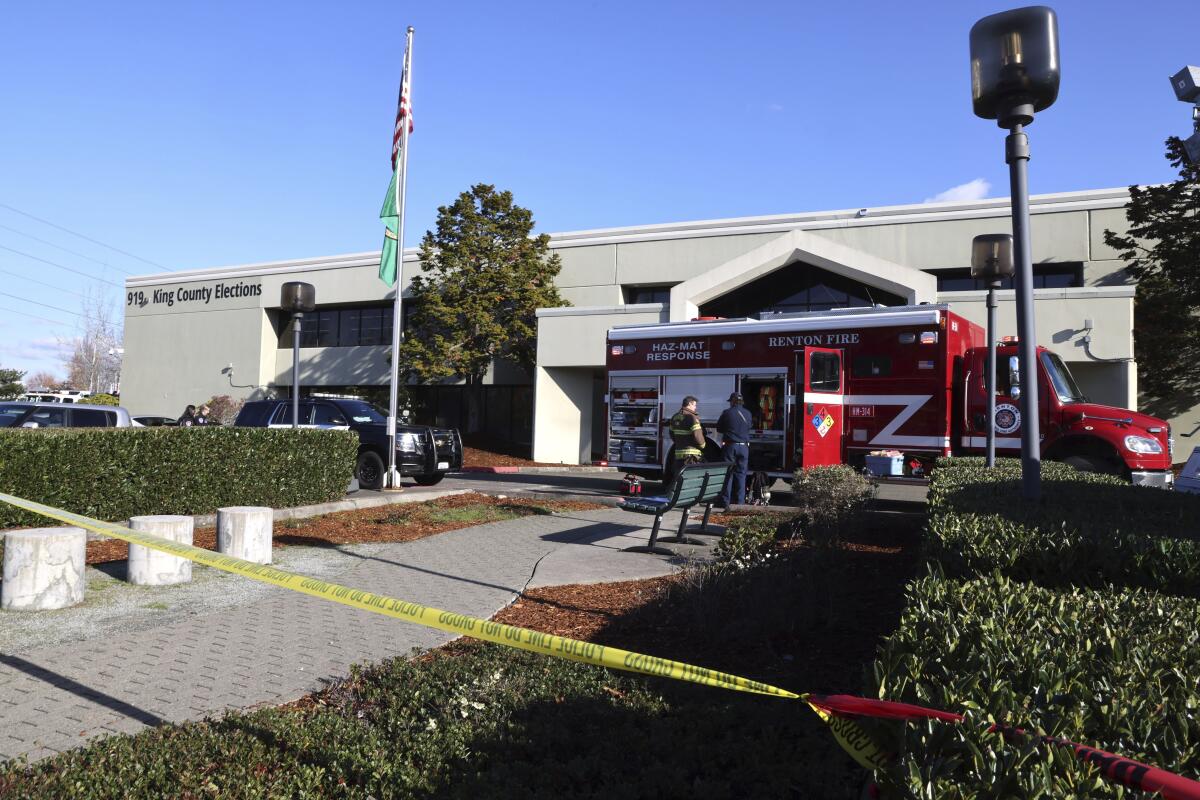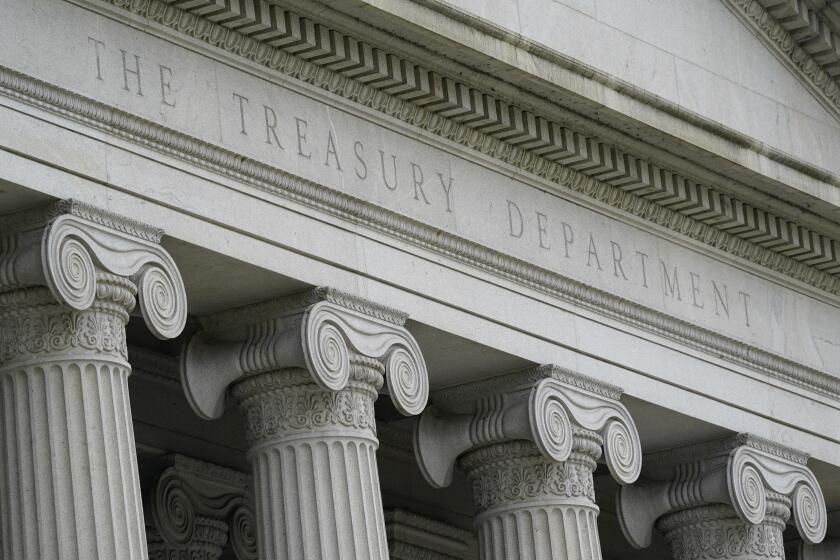Election offices in five states receive envelopes with fentanyl or other substances

WASHINGTON — Authorities were hunting Thursday for whoever sent suspicious letters — some containing fentanyl — to elections offices in at least five states this week, delaying the counting of ballots in some local races in the latest instance of threats faced by election workers around the country.
The letters were sent to elections offices in the presidential battlegrounds of Georgia and Nevada, as well as California, Oregon and Washington, with some being intercepted before they arrived. Four of the letters contained fentanyl, the FBI and U.S. Postal Inspection Service reported in a statement to elections officials Thursday.
“Law enforcement is working diligently to intercept any additional letters before they are delivered,” the statement said.
The Pierce County auditor’s office in Tacoma, Wash., released images of the letter it received, showing it had been postmarked in Portland, Ore., and read in part: “End elections now.”
In Seattle, King County Elections Director Julie Wise said that letter appeared to be the same one her office got — and that it was “very similar” to one King County received during the August primary, which also contained fentanyl.
The Treasury Department has imposed sanctions on 13 members of Mexico’s Sinaloa cartel and four Mexico-based firms accused of trafficking fentanyl.
Among the offices that appeared to be targeted was Fulton County in Georgia, which includes Atlanta and is the largest voting jurisdiction in one of the nation’s most important presidential swing states. It is also where state charges were brought against former President Trump related to his efforts to reverse the 2020 election results in Georgia.
Authorities were working to intercept the letter. In the meantime, Georgia Secretary of State Brad Raffensperger said officials were sending the overdose-reversal drug naloxone to the office as a precaution.
“This is domestic terrorism, and it needs to be condemned by anyone that holds elected office and anyone that wants to hold elective office anywhere in America,” said Raffensperger, a Republican.
In California, the United States Postal Service intercepted two suspicious envelopes that were headed to election facilities in Los Angeles and Sacramento.
Authorities in Lane County, Ore., which includes the University of Oregon, were investigating a piece of mail that arrived at the local election office Wednesday. No one who came in contact with it had experienced any negative health effects, said Devon Ashbridge, spokeswoman for the Lane County elections office in Eugene.
The incident prompted officials to close the office and delayed an afternoon pickup of ballots. Ashbridge declined to provide further details.
“Someone attempted to terrorize our elections staff, and that’s not OK,” Ashbridge said.
A man convicted of second-degree murder for supplying fentanyl to a 26-year-old woman who died from the drug has been sentenced to 15-years to life in the state’s first fentanyl-related homicide trial.
On Wednesday, authorities in Washington state said four county election offices had to be evacuated as election workers were processing ballots cast in Tuesday’s election, delaying vote-counting.
Election offices in King, Skagit, Spokane and Pierce counties received envelopes containing powders. Local law enforcement officials said the substances in King and Spokane counties field-tested positive for fentanyl. In at least one other case, the substance was baking soda.
Pierce County Auditor Linda Farmer released images of the envelope and letter her office received. The letter contained a warning about the vulnerability of “ballot drops” and read: “End elections now. Stop giving power to the right that they don’t have. We are in charge now and there is no more need for them.”
The letter featured an antifascist symbol, an LGBTQ+ “progress” Pride flag and a pentagram. While the symbols have sometimes been associated with leftist politics, they also have been used by conservative figures to label and stereotype the left, and the sender’s political leanings were unclear.
Elections offices in two Washington counties — King and Okanogan — also received suspicious envelopes while processing ballots during the August primary, and the letter sent to King County tested positive for traces of fentanyl. Those letters remain under investigation by the U.S. Postal Inspection Service and the FBI.
Washington Secretary of State Steve Hobbs called the incidents in his state “acts of terrorism to threaten our elections.”
Fentanyl-related deaths among children increased more than 30-fold between 2013 and 2021 in the U.S., according to a study by the Yale School of Medicine.
White House spokeswoman Olivia Dalton said the Biden administration was aware of the investigation. “We are grateful for the election and poll workers who served this week to ensure the security of our democratic processes,” she said.
Fentanyl, an opioid that can be 50 times as powerful as the same amount of heroin, is driving an overdose crisis deadlier than any the U.S. has ever seen as it is pressed into pills or mixed into other drugs. Briefly touching fentanyl cannot cause an overdose, and researchers have found that the risk of fatal overdose from accidental exposure is low.
Jeanmarie Perrone, director of the Center for Addiction Medicine and Policy at the University of Pennsylvania, said studies simulating exposure from opening envelopes containing powders showed that very little, if any, of the powder becomes aerosolized to cause toxicity through inhalation.
She noted that factory workers in manufacturing facilities often wear some level of protective equipment, but even incidental nasal exposure has not been found to cause toxicity in those workers.
“We have really good evidence that it wouldn’t be exposed through the skin, or through inhalation,” Perrone said.
Federal agencies are questioning Snapchat’s role in the spread and sale of fentanyl-laced pills as part of a broader probe into the opioid crisis.
It was not immediately clear how authorities came to suspect that a letter might have been sent to Georgia’s biggest election office. Raffensperger said the state alerted all 159 of its counties of the possible threat Wednesday, but believes only Fulton County is being targeted.
It’s the latest disruption since the 2020 election to the office that oversees voting in and around Atlanta.
Fulton County Commission Chairman Robb Pitts, speaking at a news conference Thursday with Raffensperger, said the county’s election workers had been under threat since at least when two of them were singled out after the 2020 presidential election, when Trump, then still president, attorney Rudolph W. Giuliani and others falsely alleged that election workers were stuffing ballots to aid Democrats. Democrat Joe Biden narrowly won the state.
Part of the Fulton County prosecution that indicted Trump, Giuliani and 17 others includes criminal charges focusing on statements and acts made against election workers.
“There’s people out there who want to do harm to our workers and want to disrupt, interrupt the flow of democracy and free, open and transparent elections, and we’re prepared for it,” said Pitts, an elected Democrat.
Despite a new state-local partnership formed to crack down on fentanyl trafficking, 63 people overdosed on the drug in San Francisco in May.
Pitts said he believes that Georgia’s most populous county will be the “focal point” of election scrutiny in 2024.
“So this was a good trial run for us, I hate to say it,” he said.
Many election offices across the United States have taken steps to increase the security of their buildings and boost protections for workers amid an onslaught of harassment and threats after the 2020 election and the false claims that it was rigged.
It’s a “sad reality” that election officials are still facing threats, said David Becker, a former attorney in the Justice Department’s Civil Rights Division who works with election officials through the nonprofit Center for Election Innovation & Research.
“While it may be unlikely this attack would cause serious damage, it seems clearly designed to terrorize the public servants in these offices who run elections,” Becker said.
Komenda reported from Tacoma and Johnson from Seattle. Associated Press writers Jeff Amy in Atlanta, Ali Swenson in New York, Josh Boak in Chicago, Claudia Lauer in Philadelphia, Adam Beam in Sacramento and Lindsay Whitehurst contributed to this report.
More to Read
Sign up for Essential California
The most important California stories and recommendations in your inbox every morning.
You may occasionally receive promotional content from the Los Angeles Times.















